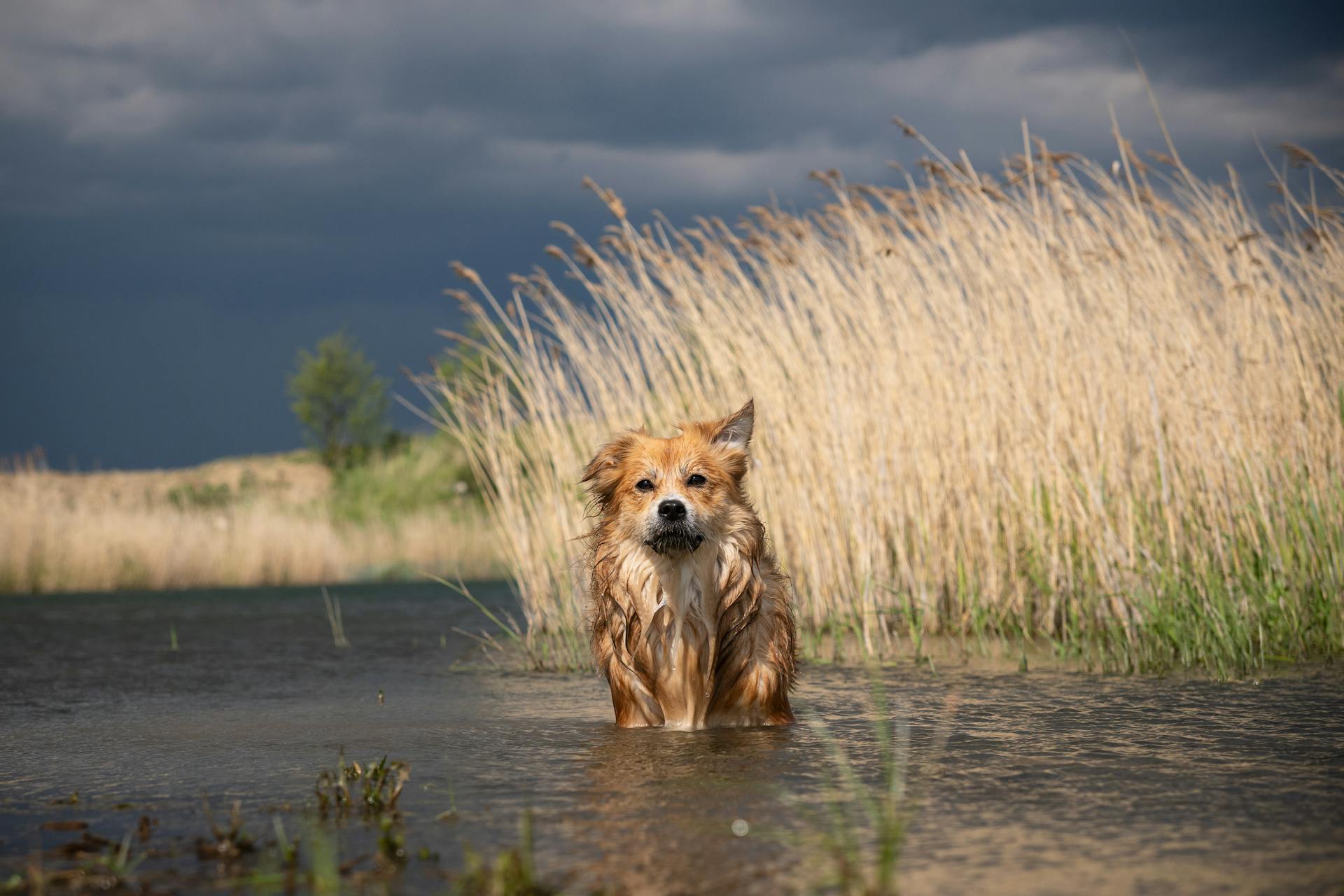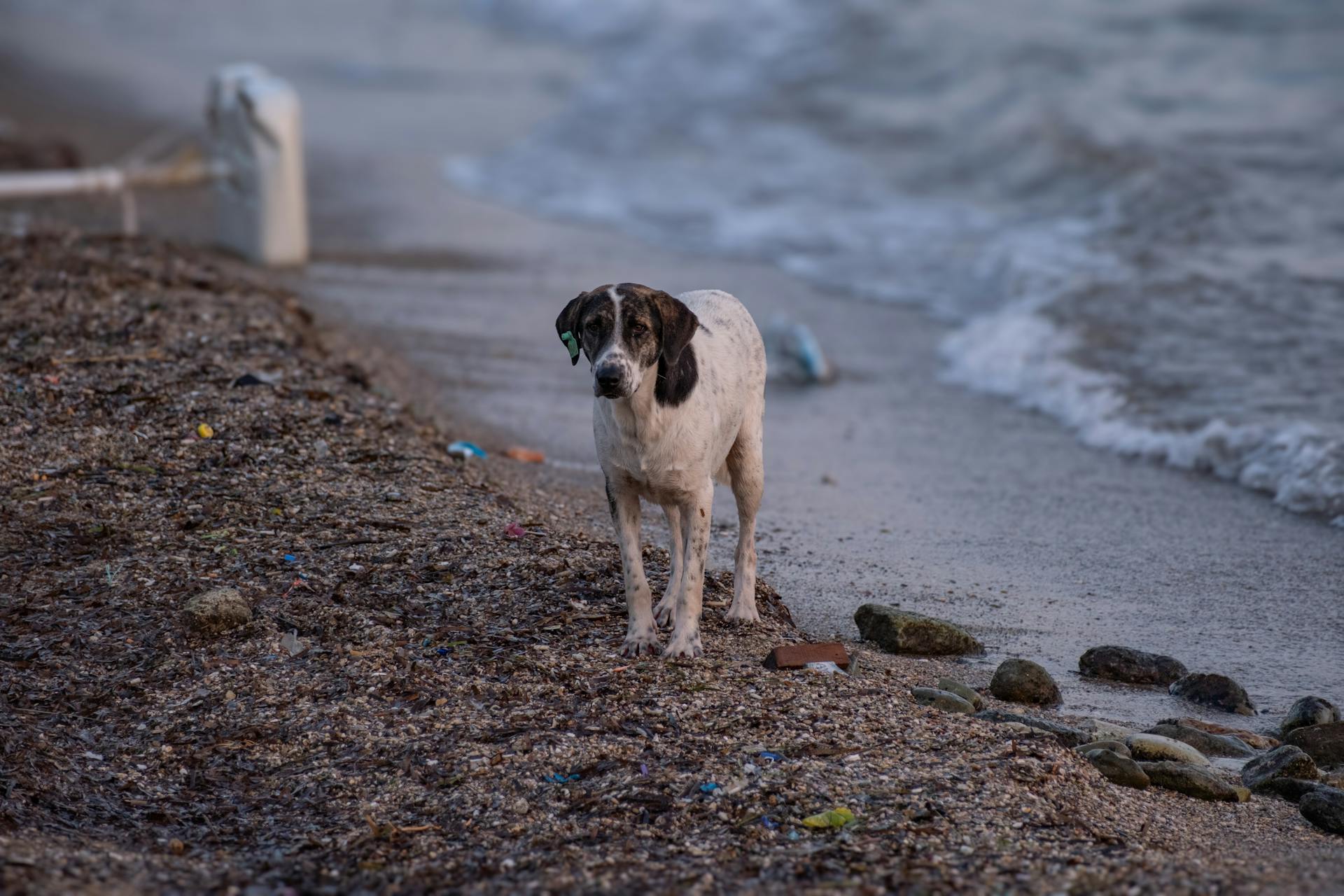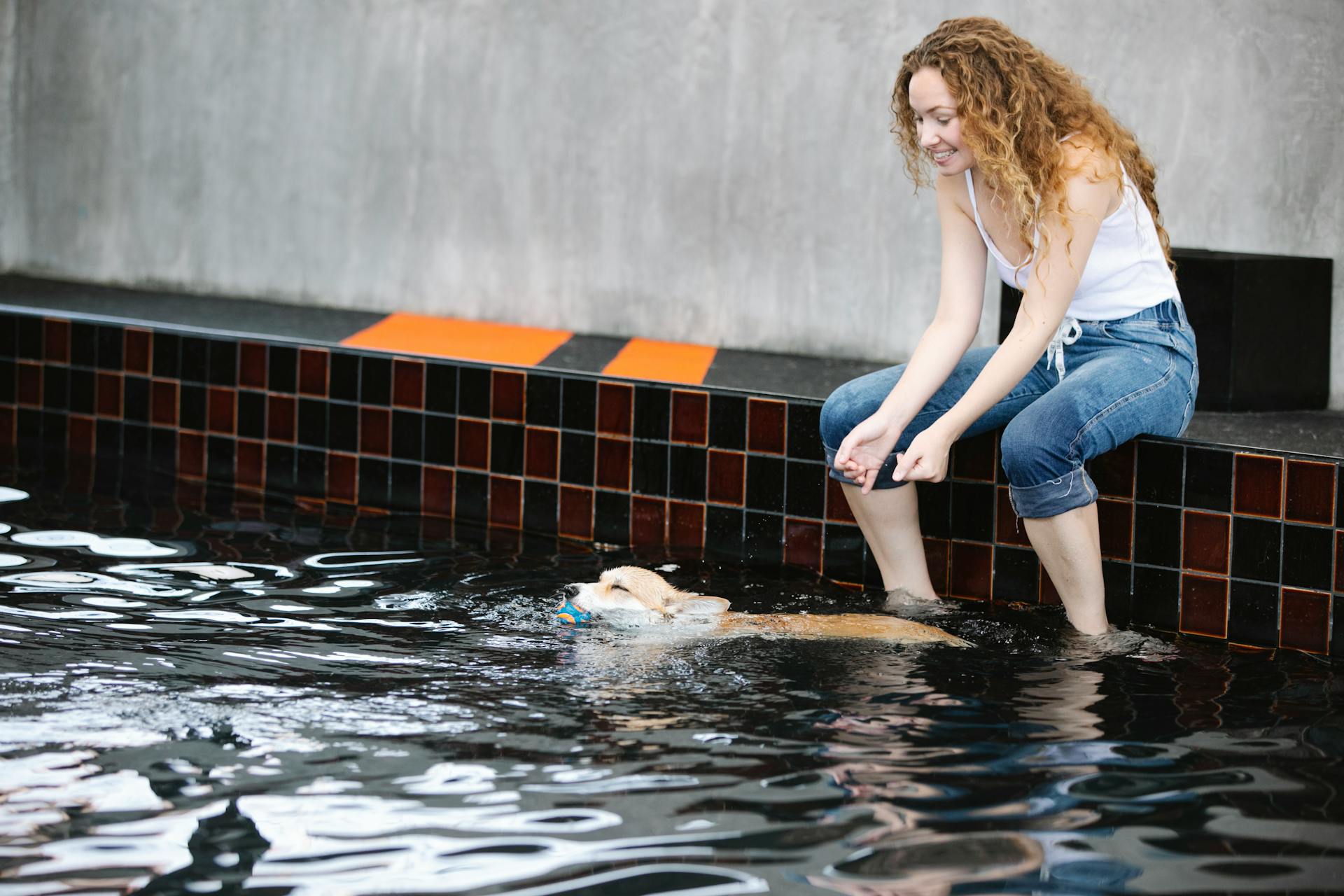
The Portuguese Water Dog Poodle mix is a unique and fascinating breed that's gaining popularity worldwide. This intelligent and active dog is a perfect companion for outdoor enthusiasts and families alike.
They typically weigh between 40-70 pounds and stand between 17-23 inches tall, making them a medium to large-sized dog. Their coats can range from curly to wavy and come in various colors including black, white, and apricot.
Their energy level is high, requiring regular exercise and mental stimulation to prevent boredom and destructive behavior. Regular walks, playtime, and training sessions are a must for this breed.
What Is a Portidoodle?
A Portidoodle is a designer dog obtained by cross-breeding a Portuguese Water Dog with a Standard or Mini Poodle.
Portidoodles are also known as Portuguese Water Doodles, a name that suggests their unique heritage.
They are affectionate dogs, known for their loving nature, which makes them a great companion for many families.
Origin and History
The Portuguese Water Dog has a rich history that dates back centuries. They were originally bred to assist Portuguese fishermen in their daily tasks.
Their ancestors were used to drive fish into nets, retrieve gear from the water, and even swim messages from boat to boat. This hard work earned them the nickname Cao de Agua, or "dog of the water", in their homeland.
As fishing became more modernized in the early 20th century, the breed nearly disappeared. However, thanks to a wealthy Portuguese dog lover named Vasco Bensuade, the breed was saved.
In the 1970s, the Portuguese Water Dog Club of America was formed, with only 12 known Porties in the US at the time. Just a decade later, their numbers had increased to 650.
The breed's popularity continued to grow, and in 1983, the American Kennel Club (AKC) recognized the Portuguese Water Dog as a distinct breed. Today, they rank 69th in popularity among the 155 breeds and varieties recognized by the AKC.
You might like: Akc Dog Types
Parent Breeds
The Portuguese Water Dog Poodle mix inherits its parent breeds' characteristics, making it a unique and wonderful companion.
The Portuguese Water Dog, which can weigh up to 60 pounds, brings its intelligence, social nature, and trainability to the mix.
The Poodle, available in toy, small, and medium-sized varieties, contributes its low-shedding coat and high intelligence.
Breed
The Portuguese Water Dog and Poodle are both medium-sized breeds. They can weigh up to 60 pounds.
The Portuguese Water Dog comes in a variety of colors, including brown, black, cream, fawn, red, silver, blue, and white.
Portuguese Water Dogs are highly social dogs that thrive in families with children and other social dogs. They are also great with other pets that are well-socialized.
Their intelligence and trainability make them a joy to work with, and their friendly nature makes them a great addition to any family.
Comparison
The Portuguese Water Dog and Mini Portidoodle are two breeds that are closely related, with the Portuguese Water Dog being one of the parent breeds of the Mini Portidoodle. This makes them both great family dogs, excellent with kids and other social dogs.
Both breeds have a low-shedding, hypoallergenic coat that's perfect for owners with pet-related allergies. They're also highly intelligent and trainable, making them a joy to work with.
The Portuguese Water Dog is a medium-sized breed that can weigh up to 60 pounds, while the Mini Portidoodle is a smaller breed with a wider variety of coat colors. The Portuguese Water Dog is also a bit more independent and can be left alone for up to 8 hours a day, while the Mini Portidoodle can develop separation anxiety if left alone for too long.
Both breeds are great companions for families and are equally charming, but the Mini Portidoodle is entirely devoted to its family, whereas the Portuguese Water Dog is more open and affectionate towards everyone it meets. They're both highly sociable dogs that adapt easily to apartment life or large homes.
The Portuguese Water Dog has a low-maintenance coat that needs only one or two weekly brushings, while the Mini Portidoodle has a moderate-maintenance coat that needs to be brushed every other day if not daily.
You might like: Smooth Haired Fox Terrier Puppies
Physical Characteristics
The Portuguese Water Dog Poodle mix, also known as a Portidoodle, can come in a wide range of sizes, with no set standards for height and weight.
Their size can vary depending on the size of the Poodle they were bred with, and Mini Portidoodles typically weigh between 14-28 pounds and stand 10-20 inches tall.
The Portuguese Water Dog Poodle mix has a non-shedding, hypoallergenic coat that is either wavy or curly in texture, and comes in various colors and color combinations.
Here are the key physical characteristics of the Portuguese Water Dog Poodle mix:
Physical Features
Portidoodles come in a wide range of sizes, with no standard height and weight requirements. This is because they're a hybrid breed not recognized by major Kennel Clubs.
You can expect Mini Portidoodles to weigh between 14-28 pounds and measure between 10-25 inches tall. Standard Portidoodles typically measure between 17-22 inches and weigh up to 60 pounds.
The Mini Portidoodle stands at 10 to 20 inches tall and weighs between 14 to 28 pounds. They have a well-proportioned athletic body, dark expressive eyes, and a long puffy tail.
Their coats are non-shedding, hypoallergenic, and all-season-friendly, coming in various colors and color combinations. The coat texture can be wavy or curly.
Here's a comparison of the Portuguese Water Dog and the Mini Portidoodle's physical features:
Highlights
Portuguese Water Dogs have webbed feet, making them natural swimmers. Their curly or wavy coat is a distinctive feature and also considered hypoallergenic.
Adult Portuguese Water Dogs typically weigh between 25-60 pounds and stand 15-20 inches tall. Their wavy, curly coat comes in a variety of colors including black, white, and brown.
They have a low-shedding coat, which makes grooming and maintenance easier. Their hypoallergenic coat doesn't shed much, but it does require regular grooming to prevent matting.
Here are the key differences in adult weight and height between Portuguese Water Dogs and Mini Portidoodles:
Their curly or wavy coat requires regular grooming to prevent matting and tangling.
Coat and Grooming
The Portuguese Water Dog Poodle mix, also known as a Portidoodle, has a coat that's a combination of its parent breeds. They usually inherit the curly and wavy coats of their Poodle parent, with a single coat type that sheds minimally.
Their coat colors can vary, including black, white, fawn, grey, chocolate, merle, and sable. You might also see various markings and patterns on their coat.
To keep their coat looking its best, regular brushing is a must. Brush or comb your Portidoodle two or three times a week to prevent tangles and matting. This will also help keep their coat tangle-free.
In addition to brushing, regular trimming is necessary to prevent their hair from growing indefinitely. This can lead to problems like reduced vision, matting, and skin conditions. To prevent this, trim their hair every two months, and consider a lion clip or retriever clip to keep their coat looking neat.
Expand your knowledge: Poodle Dog Hair
Here are some popular clipping options for your Portidoodle:
- The Lion Cut – The dog is left with a mane of hair by cutting the hindquarters, muzzle and lower two thirds of the tail.
- The Retriever Cut – The hair is cut to 2.5cm long all over the body.
Don't forget to trim their nails regularly to prevent overgrowth. If you can hear their nails clicking on the floor, it's time for a trim. Short, neatly trimmed nails will keep their feet in good condition and prevent scratched shins when they jump up to greet you.
Hypoallergenic and Health
Portuguese Water Dog Poodle mix, also known as Portidoodle, is generally a healthy breed. They can suffer from hip and elbow dysplasia, patellar luxation, and thyroid issues, among other health problems.
Portidoodles have a lifespan of 12-16 years, with Mini Portidoodles living up to 16 years and Standard Portidoodles living up to 14 years.
To minimize the risk of inherited health issues, reputable breeders DNA test their breeding dogs and conduct hip and elbow scoring. Health clearances should be provided by breeders, including clearances for hips, eyes, and storage disease (GM1).
Here's a list of common health issues that can affect Portidoodles:
- Eye problems
- Skin conditions
- Addison's disease
- Hip dysplasia
- Bloat
- Thyroid issues
- Epilepsy
Are Hypoallergenic?
Portidoodles tend to be low-shedding since both parent dog breeds shed minimally. Both breeds have tight, curly coats that are water-resistant and dry quickly.
No dog is 100% hypoallergenic, as pet allergy symptoms can be triggered by a dog's saliva and urine.
You can take precautions like washing your hands frequently, not allowing your Portidoodle to lick your face, taking baths frequently, and vacuuming with a HEPA filter-based vacuum.
Visiting a breeder's home and interacting with their dogs and puppies can help you determine if a Portidoodle triggers an allergic reaction.
Health and Conditions
Portuguese Water Dogs and their mixes, like the Portidoodle, are generally healthy breeds. However, they can be prone to certain health issues.
Hip dysplasia is a common condition in these breeds, where the thighbone doesn't fit snugly into the hip joint. This can lead to pain and lameness in the rear legs, and arthritis can develop as the dog ages.
For another approach, see: Bernese Mountain Dog Hip Dysplasia
Reputable breeders DNA test their breeding dogs and conduct hip and elbow scoring to identify potential issues. You should also look for health clearances from organizations like the Orthopedic Foundation for Animals.
Some breeds, including Portuguese Water Dogs, are also prone to eye problems like progressive retinal atrophy (PRA). This degenerative eye disorder can cause blindness, but dogs can still live happy lives with their other senses.
Storage disease (GM1) is another genetic disorder that can affect these breeds. A DNA test can determine whether a dog is a carrier or has the disease.
Here are some common health conditions that can affect Portuguese Water Dogs and their mixes:
- Hip dysplasia
- Progressive retinal atrophy (PRA)
- Storage disease (GM1)
- Eye problems
- Thyroid issues
- Epilepsy
It's essential to work with a reputable breeder who prioritizes the health of their dogs. They should provide health clearances for both parents and DNA test their breeding dogs for conditions like GM1.
Cost and Care
The cost of a Portuguese Water Dog Poodle Mix can be steep, with reputable breeders in Australia charging between $3000-$5000 for a single puppy. Some Portidoodles, including the mini size and those with rare coat colours and patterns, can cost even more.
You might enjoy: Miniature Bull Terrier Cost
Adopting a Portidoodle from a shelter is also an option, but it's rare to find one. You might have to pay a fee of $300-$500 for adopting a rescue Portidoodle.
To care for a Portuguese Water Dog, you'll need to provide at least 30 minutes to an hour of exercise daily, which can be as simple as a long walk or a game of fetch.
Cost
The cost of a Portidoodle can vary depending on the breeder and the puppy's characteristics. Most reputable breeders in Australia charge between $3000-$5000 for a single Portidoodle puppy.
If you're looking to adopt a Portidoodle, be prepared to pay a fee of $300-$500. Some Portidoodles, including the mini size and those with rare coat colours and patterns, can cost even more than this range.
You may be able to find a Portidoodle at a dog shelter, but it's worth noting that they are a rare poodle cross.
For more insights, see: Rare Bull Terrier
Cost and Care

When choosing a high-quality dog food for your Portidoodle, look for USDA-certified, human-grade ingredients and a food that meets or exceeds AAFCO guidelines.
The cost of dog food can vary greatly depending on the quality and brand you choose. A good rule of thumb is to expect to spend around $50 to $75 per month on high-quality dog food for your Portidoodle.
You can also consider making your own dog food at home, but this requires a significant investment in time and resources. The Raggy Dogs, for example, enjoy homemade raw dog food meals made with human-grade meats, raw meaty bones, and homegrown organic vegetables.
Feeding your Portidoodle twice a day, rather than leaving food out all the time, can also help to reduce waste and save you money in the long run. According to the recommended daily amount, your adult Portidoodle should eat 2.5 to 3.5 cups of high-quality dog food daily.
Supplements can also be a beneficial addition to your Portidoodle's diet, but be sure to consult with your veterinarian before introducing new foods or supplements. Healthy oils such as fish or flaxseed oils, and glucosamine or green-lipped mussels are good options to consider.
A unique perspective: Are Portuguese Water Dogs Good for First Time Owners
Care

Portuguese Water Dogs are social butterflies and thrive in homes with their family, not outside. They need a fenced yard for safe play, but with enough exercise, they can adapt to apartment life.
A Portie requires 30 minutes to an hour of exercise daily, which can be met with long walks, jogging, swimming, or games of fetch. This will keep them happy and calm indoors.
Without sufficient exercise, your belongings might become chew toys, so plan for regular physical activity. Provide plenty of chew toys and rotate them regularly to keep your Portie engaged.
Teach your Portuguese Water Dog early what's okay to chew and what's not to avoid unwanted destruction. Positive reinforcement techniques like praise, play, and food rewards work wonders for their training.
Training sessions should be short and fun, avoiding endless repetition that can lead to boredom. With their quick learning ability, they'll master new skills in no time.
Consider enrolling your Portie in obedience, agility, tracking, or water work to stimulate their mind and provide the activity they love. They can even make wonderful therapy dogs or learn cool tricks to amaze your neighbors.
Additional reading: Bernese Mountain Dog Exercise
Puppies and Breeders
The Portidoodle is a rare designer dog breed in Australia, and finding breeders or puppies for sale can be a challenge. Consider looking for a rescue or other similar poodle mixes.
Portuguese Water Dog Poodle Mix puppies are active, playful, yet trainable. They have a soft and curly coat that is water-repellent.
You'll need to provide a balanced and healthy diet for your Portidoodle puppy, so they receive the right nutrients to grow and develop in adults. This will help them stay healthy and thrive.
As a new hybrid dog breed, you might have difficulty finding them up for adoption. So, your next option is to get them from a reputable and ethical breeder that specializes in Portuguese Water Dog or Poodle mixes.
The Porti poodle mix is particularly popular because of its non-shedding, hypoallergenic coat and high trainability. This makes it a great choice for people with allergies or a desire for a low-maintenance coat.
Additional reading: Dog Coat Types
Frequently Asked Questions
Are portidoodles good dogs?
Portidoodles are loyal, friendly, and highly intelligent dogs, making them an excellent choice for families with children
How much do Portidoodles weigh?
Portidoodles typically weigh between 40 to 70 pounds as adult dogs. Their weight range makes them a suitable choice for many families.
How much is a portidoodle?
A Portidoodle's price typically ranges from $2,000 to $5,000, influenced by factors like breeder, age, and size. Learn more about this unique breed and its costs.
How long do portidoodles live?
Portidoodles typically live between 10 to 15 years with proper care. With regular exercise, a balanced diet, and veterinary care, they can live even longer.
How much is a poodle Portuguese Water Dog?
The cost of a Portuguese Water Dog can range from $2,000 to $3,000, depending on the breeder's reputation and the dog's pedigree. Prices may vary, but this breed is generally considered to be a mid-range investment.
Sources
- https://raggydogs.com.au/blog/portidoodle-portuguese-water-dog-poodle-mix/
- https://dogtime.com/dog-breeds/portuguese-water-dog
- https://www.dogzone.com/breeds/portuguese-water-dog/
- https://www.dogster.com/dog-breeds/portuguese-water-dog-poodle-mix
- https://premierpups.com/compare-breeds/portuguese-water-dog-vs-mini-portidoodle-comparison
Featured Images: pexels.com


